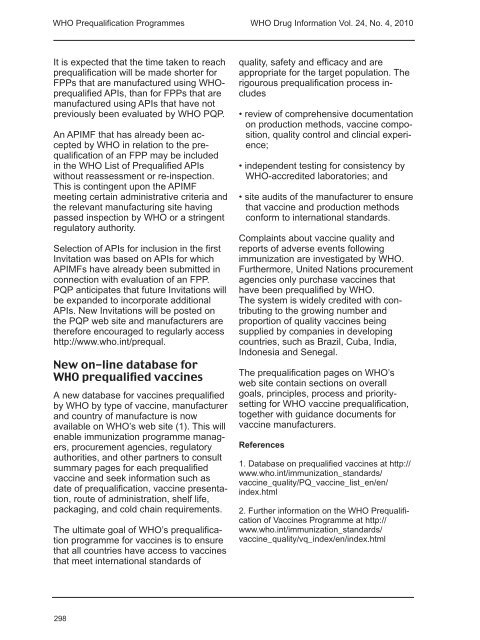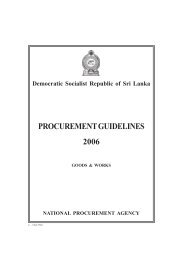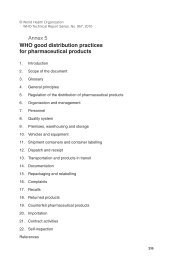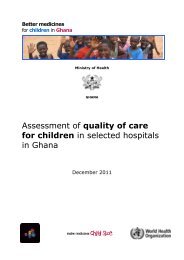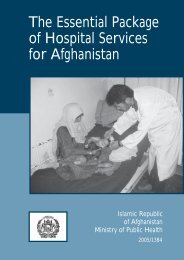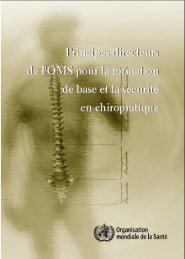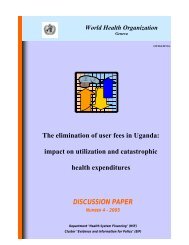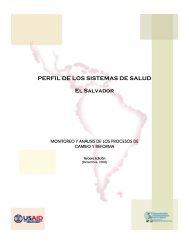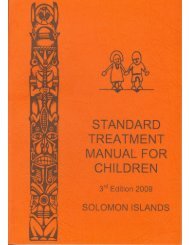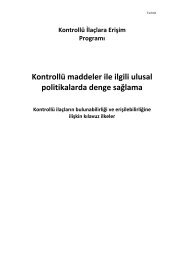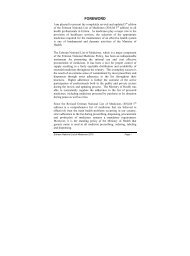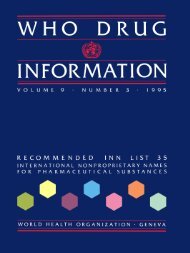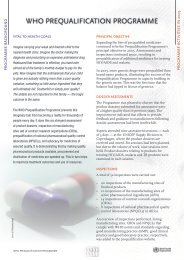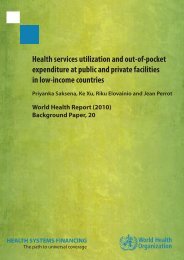WHO Drug Information Vol. 24, No. 4, 2010
WHO Drug Information Vol. 24, No. 4, 2010
WHO Drug Information Vol. 24, No. 4, 2010
Create successful ePaper yourself
Turn your PDF publications into a flip-book with our unique Google optimized e-Paper software.
<strong>WHO</strong> Prequalification Programmes<strong>WHO</strong> <strong>Drug</strong> <strong>Information</strong> <strong>Vol</strong>. <strong>24</strong>, <strong>No</strong>. 4, <strong>2010</strong>It is expected that the time taken to reachprequalification will be made shorter forFPPs that are manufactured using <strong>WHO</strong>prequalifiedAPIs, than for FPPs that aremanufactured using APIs that have notpreviously been evaluated by <strong>WHO</strong> PQP.An APIMF that has already been acceptedby <strong>WHO</strong> in relation to the prequalificationof an FPP may be includedin the <strong>WHO</strong> List of Prequalified APIswithout reassessment or re-inspection.This is contingent upon the APIMFmeeting certain administrative criteria andthe relevant manufacturing site havingpassed inspection by <strong>WHO</strong> or a stringentregulatory authority.Selection of APIs for inclusion in the firstInvitation was based on APIs for whichAPIMFs have already been submitted inconnection with evaluation of an FPP.PQP anticipates that future Invitations willbe expanded to incorporate additionalAPIs. New Invitations will be posted onthe PQP web site and manufacturers aretherefore encouraged to regularly accesshttp://www.who.int/prequal.New on-line database for<strong>WHO</strong> prequalified vaccinesA new database for vaccines prequalifiedby <strong>WHO</strong> by type of vaccine, manufacturerand country of manufacture is nowavailable on <strong>WHO</strong>’s web site (1). This willenable immunization programme managers,procurement agencies, regulatoryauthorities, and other partners to consultsummary pages for each prequalifiedvaccine and seek information such asdate of prequalification, vaccine presentation,route of administration, shelf life,packaging, and cold chain requirements.The ultimate goal of <strong>WHO</strong>’s prequalificationprogramme for vaccines is to ensurethat all countries have access to vaccinesthat meet international standards ofquality, safety and efficacy and areappropriate for the target population. Therigourous prequalification process includes• review of comprehensive documentationon production methods, vaccine composition,quality control and clincial experience;• independent testing for consistency by<strong>WHO</strong>-accredited laboratories; and• site audits of the manufacturer to ensurethat vaccine and production methodsconform to international standards.Complaints about vaccine quality andreports of adverse events followingimmunization are investigated by <strong>WHO</strong>.Furthermore, United Nations procurementagencies only purchase vaccines thathave been prequalified by <strong>WHO</strong>.The system is widely credited with contributingto the growing number andproportion of quality vaccines beingsupplied by companies in developingcountries, such as Brazil, Cuba, India,Indonesia and Senegal.The prequalification pages on <strong>WHO</strong>’sweb site contain sections on overallgoals, principles, process and prioritysettingfor <strong>WHO</strong> vaccine prequalification,together with guidance documents forvaccine manufacturers.References1. Database on prequalified vaccines at http://www.who.int/immunization_standards/vaccine_quality/PQ_vaccine_list_en/en/index.html2. Further information on the <strong>WHO</strong> Prequalificationof Vaccines Programme at http://www.who.int/immunization_standards/vaccine_quality/vq_index/en/index.html298


